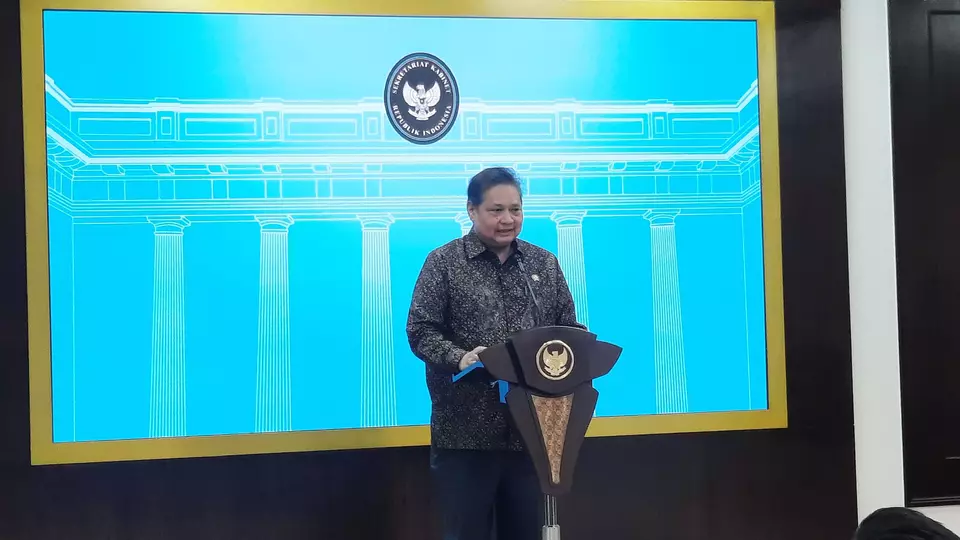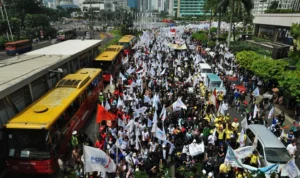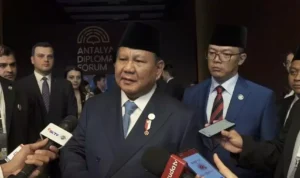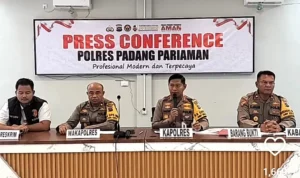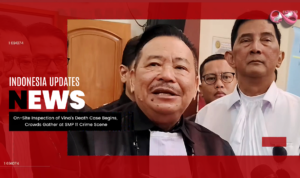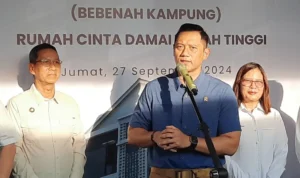INDONESIAUPDATES.COM, News En – In preparation for a state visit to Washington DC, the Indonesian government has sent an official letter to the United States, offering to initiate negotiations for a more equitable and comprehensive bilateral trade agreement. This move comes as a response to the reciprocal tariffs imposed by US President Donald Trump.
Coordinating Minister for Economic Affairs, Airlangga Hartarto, emphasized that Indonesia’s approach to economic cooperation with the US is both comprehensive and rooted in fairness. This position has been underscored by President Prabowo Subianto during a series of bilateral talks.
Indonesia’s Comprehensive Approach to Trade Negotiations
Airlangga highlighted that Indonesia’s approach is not merely a reaction to US policies but also a request for a more balanced relationship. “The steps we are taking with America are comprehensive and fair. This means that we are not only responding to US policies, but Indonesia is also making a request. This is not one-way, but two-way for the good of the bilateral economy,” said Airlangga at the Investor Daily Round Table event in Jakarta on Wednesday, April 30, 2025.
In the bilateral meeting, Indonesia proposed a new format for a trade agreement that could serve as the foundation for future relations. This new format draws from two previous agreements: the Trade and Investment Framework Agreement (TIFA) signed by the Minister of Industry and Trade, Tunky Ariwibowo, and the ASEAN–TIFA agreement, signed by former Trade Minister Mari Elka Pangestu.
Revitalizing Previous Agreements for Future Relations
“We ask that these two agreements be revitalized. Both can be the basis for Indonesia’s position in future bilateral negotiations,” explained Airlangga.
He also stressed that the primary goal of the discussion was to establish a mutually beneficial trade agreement, reflecting the national interests of both nations.
Emphasizing a Win-Win Solution
Airlangga concluded that any bilateral trade agreement with the US must be agreed upon by both parties. “In a bilateral trade agreement with the US, there must be an agreement from both sides. The principle is national interest, for the national interests of both countries. The goal is clear, namely to find a win-win solution,” he said.
The Minister also noted that this trade agreement approach is critical for addressing the dynamics of the ongoing global tariff war and ensuring the resilience of Indonesia’s economy amid external pressures.
Strategic Economic Goals for Indonesia
This proposal highlights Indonesia’s commitment to pursuing an equitable trading relationship with the US while safeguarding its economic interests in the face of global challenges. As the trade war continues to evolve, Indonesia’s proactive stance underscores its determination to maintain economic growth and stability in the international arena.
Frequently Asked Questions (FAQ) – Indonesia’s Bilateral Trade Agreement Proposal with the US
-
What is the purpose of Indonesia’s proposal to the United States?
-
Indonesia has proposed initiating negotiations for a fairer and more comprehensive bilateral trade agreement with the US in response to the reciprocal tariffs imposed by US President Donald Trump. The goal is to create a balanced and mutually beneficial trade relationship between the two countries.
-
-
Who is leading Indonesia’s trade negotiations with the US?
-
Indonesia’s trade negotiations with the US are being led by Coordinating Minister for Economic Affairs, Airlangga Hartarto, with significant involvement from President Prabowo Subianto.
-
-
What is the new trade agreement proposal based on?
-
The proposed new trade agreement format draws from two previous agreements: the Trade and Investment Framework Agreement (TIFA), signed by Minister of Industry and Trade Tunky Ariwibowo, and the ASEAN–TIFA agreement, signed by former Trade Minister Mari Elka Pangestu.
-
-
Why does Indonesia want to revitalize the TIFA agreements?
-
Indonesia aims to revitalize the TIFA agreements as the foundation for future bilateral trade relations with the US. These agreements serve as a starting point for negotiations and offer a framework for resolving issues in the trade relationship.
-
-
What is the main objective of Indonesia’s trade discussions with the US?
-
The primary objective is to reach a mutually beneficial trade agreement based on the national interests of both countries. Indonesia seeks a fair trade deal that serves the economic goals of both nations and creates a win-win situation.
-
-
How does this proposal address the global tariff war?
-
Indonesia’s proposal is designed to address the ongoing global tariff war, ensuring that the country remains resilient and its economy stays strong amidst external pressures. By establishing a fair and comprehensive trade agreement with the US, Indonesia aims to protect its economic interests in this challenging global environment.
-
-
Will this new trade agreement affect other countries in the region?
-
While the proposal directly concerns US–Indonesia relations, the revitalization of existing TIFA agreements could have broader implications for Indonesia’s trade relations with other countries in the ASEAN region, particularly in terms of economic cooperation and trade strategies.
-
-
How does Indonesia view the current US tariffs?
-
Indonesia views the current US tariffs as an opportunity to negotiate a better and more balanced trade agreement. The country is not merely reacting to US policies but is actively requesting a more equitable relationship that benefits both parties.
-
-
What will be the next steps after the proposal?
-
Following the proposal, Indonesia hopes to begin formal negotiations with the US government. Both sides will need to discuss and agree on the terms of a new trade agreement that reflects the national interests of each country.
-
-
How will this proposal impact Indonesia’s economy?
-
This proposal aims to strengthen Indonesia’s economic position by securing a fair trade agreement with the US. It is expected to help mitigate the effects of global economic challenges and maintain Indonesia’s economic stability and growth.
-
FOLLOW INDONESIAUPDATES.COM ON GOOGLE NEWS

